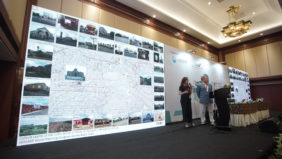
The ISOCARP Award for Excellence (AfE) rewards plans in the design phase as well as projects in progress or already implemented and is open to a wide range of professionals and institutions operating in the domain of urban and regional planning. Participants are invited to submit different tools used in planners’ daily practice: normative plans, strategic plans, urban projects, programmes, policies, research works, software, smart tools facilitating planners, etc. This prestigious award is bestowed in two categories: Grand Award and Merit Award.
In 2019, seven eligible entries were submitted:
- Guangzhou Tianhe Central Business District: Comprehensive Improvement Action Plan, by AECOM, China;
- ShapingSEQ: South East Queensland Regional Plan 2017, by Ethos Urban, Australia;
- Urban Design and Master Plan Update for Nansha Bay Area, Guangzhou, by ISA Internationales Stadtbauatelier, China;
- From DEPRESSIVE to IMPRESSIVE: The Comprehensive Plan for Generation of Coal Subsidence Area in Huaibei Downtown, by Nanjing Southeast University Urban Planning & Design Institute, China;
- Integrated Design in Weihai: Digital Urban Design in High-Density and Ecological Sensitive Metropolis, by Nanjing Southeast University Urban Planning & Design Institute, China;
- Strategy masterplan of urban transition of Turkistan City, by Urban Sustain Architects, Ukraine, and Frame Art, Kazakhstan;
- People-oriented Public Participatory Planning: Successful Practice of Public Space Improvement in High-density Urban Areas in China (Jianghan District of Wuhan), by Wuhan Land Use and Urban Spatial Planning Research Center (WLSP), China.
The evaluation process was demanding due to the quality of entries and the diversity in terms: challenges and issues faced, themes and vision, environmental issues, and finally scale (from regional, metropolitan, to urban level).
By the end of the challenging judging process, the jury composed of four experienced professional planners – Jens Aerts (US), Abdelwehab Alwehab (Iraq), Pedro Ressano Garcia (Portugal), and Siniša Trkulja (Serbia) – decided to award a plan (at the metropolitan scale) as the Grand Award Winner, as well as one project (metropolitan/urban scale) as the Merit Award Winner.
2019 Grand Award for Excellence Winner:
Strategy masterplan of urban transition of Turkistan City, by Urban Sustain Architects, Ukraine, and Frame Art, Kazakhstan.
The urban transition of Turkistan City is an ambitious plan for both the historical city core and the new city district, covering more than 1,600 ha. Based on the long-term innovative and interdisciplinary strategy, the development priorities and key projects illustrate comprehensive and balanced development of the metropolitan area: heritage conservation and creative industries boost the cultural capital of the old city district; new business, administrative and tourist centres create urban hubs at the outskirts of the old city; finally, facing a severe ecological issues, various bioclimatic techniques for different typological scales are used to enrich the biodiversity, restore the water biotopes and riparian forests, and protect the city from dust, salt, wind and overheating.
2019 Merit Award for Excellence Winner:
People-oriented Public Participatory Planning: Successful Practice of Public Space Improvement in High-density Urban Areas in China (Jianghan District of Wuhan), by Wuhan Land Use and Urban Spatial Planning Research Center (WLSP), China.
Jianghan District of Wuhan, as a typical urban downtown in China, lacks the building stock and faces high urban density. Under such challenges, the project objectives – to stimulate the regional urban vitality and enable local people to enjoy the unique landscape – are very ambitious and socially significant. The project offers a clear methodology used for analysis, strategy development and implementation actions, which can be successfully applied to other similar cases. Its greatest asset is, however, in intersectoral, interdisciplinary and ‘citizen science’ approach, speaking clearly for innovations in terms of both governance procedures and digital tools.
We are thankful to all the submitters who clearly demonstrated how diverse, meaningful, challenging, and interesting the planning profession is, and how much our work can contribute for a better world. Therefore, we invite and hope for many more entries in the coming years. It is not a matter of scale, but of quality and eye-opening projects, which can serve as outstanding examples of contemporary planning practice.